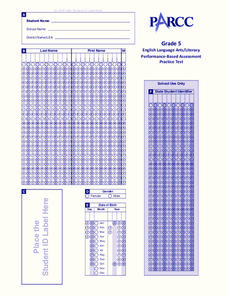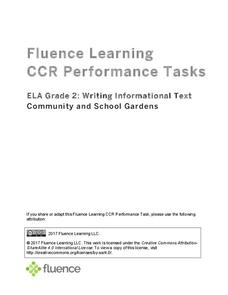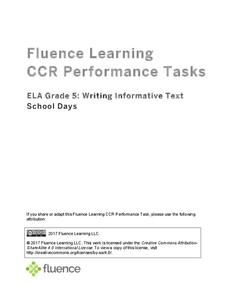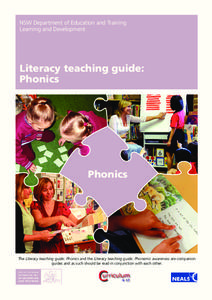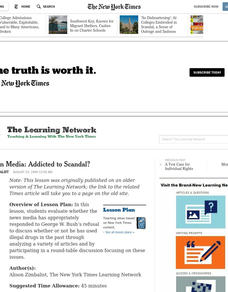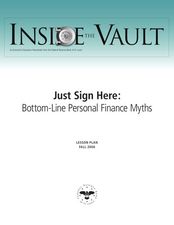Open Oregon Educational Resources
Digital Foundations: Introduction to Media Design with the Adobe Creative Cloud, Revised Edition
How can Adobe Creative Cloud enhance digital art and media design? Readers explore just that with the Digital Foundations eBook. They learn how to source images and how to create symmetry and asymmetry in their digital designs. They also...
Curated OER
Performance-Based Assessment Practice Test (Grade 11 ELA/Literacy)
Support your eleventh graders with a practice assessment for the Common Core tests. The practice test features a series of literary and informational passages and related multiple choice and essay questions. An online version is also...
Curated OER
Performance-Based Assessment Practice Test (Grade 4 ELA/Literacy)
Track the progress of your fourth graders' reading and writing skills with this practice Common Core assessment. Based on a collection of six reading passages that include narrative stories, poetry, and a series of informational...
Curated OER
Performance-Based Assessment Practice Test (Grade 5 ELA/Literacy)
Check in on the development of your fifth graders' reading and writing skills with this Common Core-designed assessment. Given a series of six reading passages ranging from narrative stories to informational texts, young learners answer...
EngageNY
Interpreting, Integrating, and Sharing Information about DDT: Using Cascading Consequences and Fishbowl Protocol
What is your interpretation? Scholars look at their Cascading Consequences Charts and interpret the information they have gathered. Learners match claims with evidence and then watch a video. At the end, they carry out a fishbowl...
Fluence Learning
Writing About Informational Text: The Dred Scott Decision
Looking for a performance assessment that asks individuals to demonstrate their competency in writing about informational text? Use Frederick Douglass' essay "On the Dred Scott Decision," and an excerpt from Abraham Lincoln's 1857 speech...
Fluence Learning
Writing About Informational Text: Political Parties
To demonstrate their ability to craft an analysis of informational text, class members read excerpts from James Madison's "The Federalist No. 10," from George Washington's Farewell Address, and from Thomas Jefferson's First Inaugural...
Fluence Learning
Writing Informational Text: Community and School Gardens
Two informational texts feature community gardens of the past and present and how seeds grow. Scholars read, discuss what they have read, complete a timeline, define words, and compose a brief essay about the texts' main idea.
Fluence Learning
Writing About Informational Text: Everybody Can Bike
A three-part assessment challenges scholars to read informational texts in order to complete three tasks. Following a brief reading, class members take part in grand conversations, complete charts, and work in small groups to research...
Fluence Learning
Writing Informative Text: School Days
A three-part writing assessment challenges scholars to think critically about schools of the past and present. Learners read informative texts, answer questions to prepare for a discussion, research in small groups, complete a Venn...
Vanderbilt University
Literacy Teaching Guide: Phonics
You don't have to be a teacher in New South Wales to appreciate this phonics teaching guide. The 73-page packet is packed with information about the principles of effective phonics programs, teaching methods, sequencing, key strategies,...
PwC Financial Literacy
Evaluating Financial Information
Advertising is all around us. Sometimes those advertisements are directed at young people, so it's important for youngsters to recognize false advertising and fraud when they see it. That's what this instructional activity is all about....
The New York Times
Crossing the Line Online: Sexual Harassment and Violence in the Age of Social Media - NYTimes.com
Sexual harassment and sexual violence are by no means new issues. What has changed is the role of social media in these issues. This powerful and troubling lesson uses a specific rape case to launch research into a discussion of the...
Fluence Learning
Writing About Informational Text: Music and the Brain
Even if you've never picked up a musical instrument, chances are that music has directly impacted your mental and emotional development. Sixth graders engage in a reading activity in which they read two articles on the impact of music on...
Curated OER
Seeking, Locating, Accessing, and Using Information
Students complete reserach on a topic of their choice by following the Big Six research program. In doing so, students locate information and assess the validity and usefulness of sources.
Curated OER
American Media: Addicted to Scandal?
Students examine media coverage of George W. Bush's refusal to answer questions regarding past illegal drug usage in the 1999 campaign. They consider the role of rumor, scandal, audience and relevance in political media coverage.
Curated OER
Just Sign Here: Bottom-Line Personal Finance Myths
Students explore budgeting myths. In this personal finance lesson, students complete a series of activities that help them recognize the pros and cons of credit. Students also discover the process for obtaining loans. This lesson...
Classroom Law Project
Should we believe everything we read? Becoming a discerning consumer of media
Class members investigate the role media should play in a healthy democracy. As part of this study, groups analyze political advertising, use FactCheck to assess not only the veracity of but the persuasions techniques used in candidates'...
Social Media Toolbox
Why Social Media?
Is social media the best way to convey news in your school? Young journalists dig deep into the social media question in the second of 16 lessons from The Social Media Toolbox. After learning about the relationship between social media...
Facebook
Online Presence
What happens when an online post gets the wrong kind of attention? Learners evaluate the good, the bad, and the occasionally ugly side of social media posting with a instructional activity from a vast digital citizenship series. After...
Curated OER
Money Management Part II: Checking Accounts
Having money is great, learning to manage it wisely is imperative. First, the class has a discussion on the value and convenience of having a checking account. Then, they practice filling out deposit slips, keeping an account register,...
Curated OER
Darfur: Violence and the Media
Learners read an article on Darfur prior to class, discuss the conflict in Darfur, visit a series of websites, and complete a worksheet evaluating the reporting and sources used. They view films on genocide to decide if the Darfur...
Newseum
Can I Trust the Creators?
It's easy to find information at the click of a mouse, but is it trustworthy? Pupils learn about the E.S.C.A.P.E. acronym for evaluating sources. Next, learners read a news story and evaluate its sources to determine credibility. Last,...
Newseum
E.S.C.A.P.E. Junk News
Fair, balanced, and reputable information? There's an acronym for that! Scholars learn the E.S.C.A.P.E. method for evaluating news sources. Then, pupils work in small groups to read and analyze a news story and discuss the activity to...





